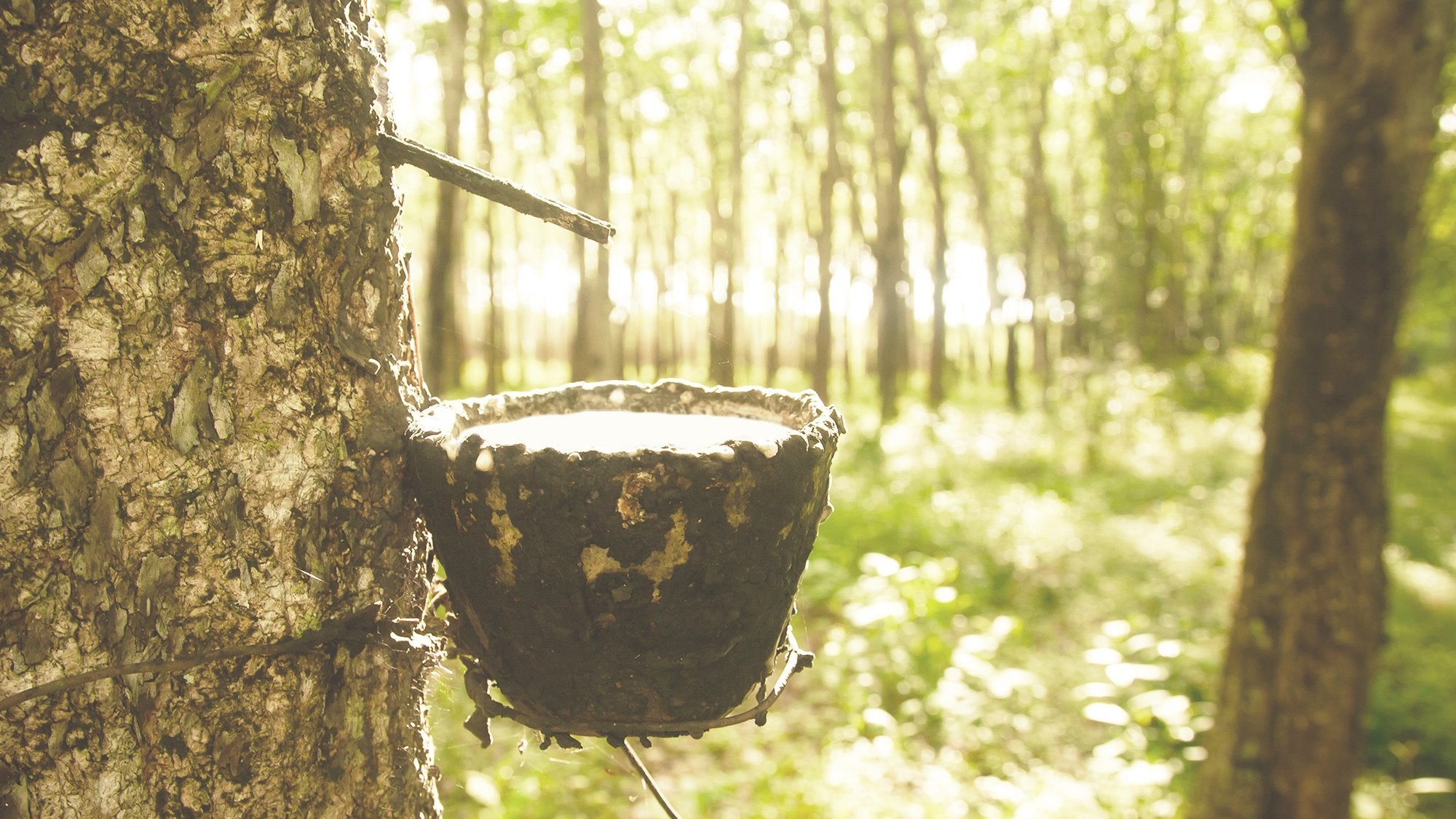Unlike most mattress materials, latex is a natural product. Its inherent softness and springiness make it perfectly suited for mattresses. You’ve probably seen some latex mattresses labelled “natural” or “organic”, while others are just “latex”. To understand why, let’s first understand what latex is.
What exactly is latex?

Latex is harvested from the sap of the rubber tree, Hevea brasiliensis. To turn the white milky liquid into a mattress, it undergoes processing akin to baking a cake: the latex is poured into a mould of the desired shape, and then vulcanised (ie. baked) until it solidifies. The amount of latex in the mould can be controlled precisely to alter the firmness of the mattress.
Latex produced this way has a completely natural origin, and is also called natural latex.
What about synthetic latex?
Synthetic latex is an artificial mimic of latex. Instead of being harvested from a natural source, it is manufactured by chemically stringing together individual molecules (monomers) to form polymer chains. The most common form of artificial latex is styrene-butadiene rubber (SBR), which bears some structural resemblance to natural latex polymers. However, the more streamlined structure of natural latex allows its polymer chains to slide past one another more easily, gives it greater elasticity and durability than artificial latex.
Although it’s cheaper to produce, synthetic latex is rarely used on its own in a mattress. Most latex mattresses in the market are either a blend of natural and synthetic latex or 100% natural.

What is the difference between "natural latex" and "organic latex"?
All organic latex is natural, ie. comes from the rubber tree. But not all natural latex is organic. In fact, most natural latex is not organic.
The production of organic latex is very tightly regulated. To be certified organic, the latex must be grown in a special plantation without any chemical pesticides or fertilizers. The ingredients used throughout the production process are also strictly controlled. Short of knowing the exact coordinates of the tree, we know where the organic latex in each mattress comes from and exactly how it was produced.
To be certain that a mattress uses only 100% organic latex, ask for the GOLS (Global Organic Latex Standard) certificate. This independent organisation defines how latex must be produced to be called “organic”, and conducts unannounced checks on the chemical levels in the soil and latex milk. For example, to rid the soil of chemicals, a GOLS-certified organic plantation must be kept unused for 4 years before any rubber trees are planted. A mattress may have been produced organically without a GOLS certification, but without proof there is no way to be sure.
Non-organic natural latex still comes from the rubber tree. However, the manufacturers do not have the same strict limits on the chemicals they can use in the plantation and processing. Just being labelled “100% natural latex” alone doesn’t tell you what else goes into your mattress.
Why should I choose organic latex?
Producing latex organically does not change its elasticity or softness. If the latex is of the same good quality, natural latex and organic latex mattresses perform the same. The differences between the two lie elsewhere, and in what is important to you.
Organic is better for our environment. The higher price that organic latex commands is fed back into preserving our natural resources. Organic latex avoids the environmental damage caused by chemical pesticide use. These chemicals may leech into and contaminate surrounding land or water bodies. If the soil accumulates these chemicals over time and eventually becomes unusable, that precious land goes to waste.
The overall environmental impact of any manufacturing process can be measured by its carbon footprint. For all organic latex used in our products, the production process is certified carbon-neutral, which means net zero emissions and no carbon footprint. We also donate to non-profit organisations fighting to saving our rainforests.
Organic is safer for your health. Many brands use excessive fear-mongering to get your attention. The truth is, we don’t really know anything for sure. We do know that volatile organic compounds (VOCs) released by many synthetic materials can cause irritation to your respiratory system. But aside from that, we still aren’t sure how most chemicals affect your health over the long-term, especially when your mattress is so close to your body for so many hours each night. Most dangerous health effects, for medication and mattresses alike, only surface after decades of use. Even then, we often have no clue how they might affect growing children.
Leave the discovering to scientists and manufacturers. For a slightly higher price upfront, protect your health and your loved ones by going organic.
A complete sleeping experience. Our sleep system cares for your comfort and your health. By knowing exactly what goes into our mattresses, we’ve done our homework so you don’t have to. So sleep worry-free, and focus on getting that good night’s rest!



